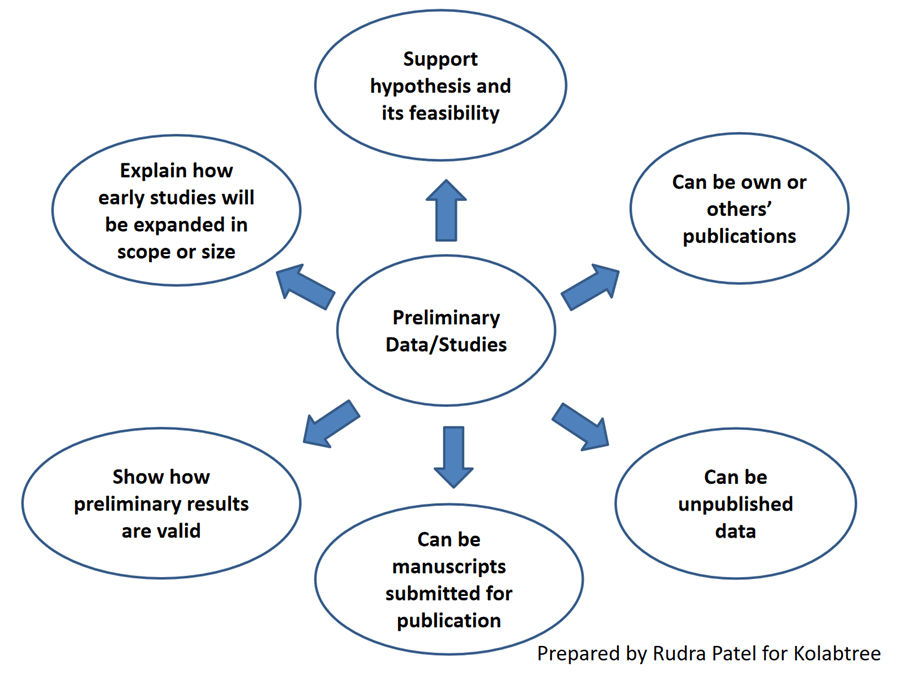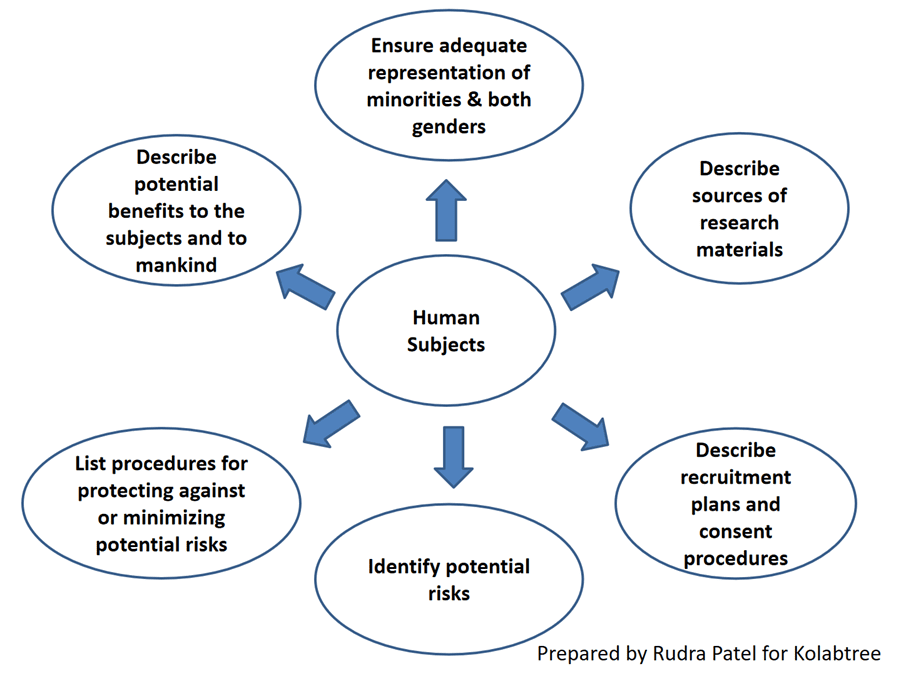Rudra Patel*, a clinical trial consultant at Kolabtree, provides a guide on how to write a strong medical research grant application.
How to write a medical research grant application
A strong grant application has several components. The topic must be novel, creative, and worthy of funding. In this article, we provide some tips on preparing a grant proposal to obtain funding for medical research. We describe a grant proposal to the US NIH as an example.
Follow the guidelines in the grant application kit, PHS 398, available on the NIH website. Your application must address:
- Significance of the intellectual quality of the study
- Potential impact of the study
- Novelty of the proposal. If not, its ability to create an impact to overcome this lack
- Ability to confirm existing hypotheses or generate new data/concepts
- Validity of hypothesis and evidence for its support
- Are the aims logical?
- Are the procedures appropriate, adequate, and feasible to conduct the research?
- Investigator(s) qualifications, competence, experience and credentials
- Availability of adequate facilities to conduct the research
Drafting a grant application is a major undertaking; nevertheless, the following advice can ensure success.
- Before writing
Carefully read the entire grant application kit and the review criteria. Note special instructions. Study the field you wish to investigate. Conceptualize an idea worthy of pursuing. Focus on the big picture. Be familiar with on-going/completed research to identify knowledge gaps. Include sufficient detail to convince reviewers that you understand potential problems in the field. Show your capability of thoroughly analyzing data with a rigorous hypothesis, and logical/feasible aims.
- Develop the hypothesis
A solid hypothesis is the foundation. Ensure you have a means to test it. Include a rationale for the hypothesis based on current scientific literature. Consider alternative hypotheses. Explain reasons for selecting the hypothesis. In medical research, a good hypothesis should seek to elucidate the pathophysiological mechanisms underlying diseases, or treatment or prevention strategies. Avoid proposing more than one hypothesis or one that lacks solid scientific basis. State your hypothesis in the abstract and in the specific aims section.
- Develop a research plan
Your research plan will determine your success in the peer review stage. Here are some tips to develop ideas:
- Base the plan on a strong hypothesis
- Ideas should flow logically
- Coordinate sections well and relate to the hypothesis
- Emphasize how the research will elucidate the mechanism underlying a disease
- Demonstrate feasibility of completing within a realistic period
- Specific aims and experiments should be directly related to the hypothesis
- Specific Aims
These are highly focused objectives to accomplish driven by the hypothesis. State the general purpose or major objectives and directly relate them to the hypothesis. Choose objectives that reviewers can easily assess.
- Background and Significance
Briefly state how your research is novel and innovatively addresses the topic or develops/improves technology to diagnose/treat diseases. Identify the next logical step beyond current hypothesis. Additionally:
- Demonstrate how your hypothesis and research will contribute to the field and improve public health
- Relate hypothesis to your long-term scientific objectives
- Justify with sufficient background information
- Literature section should demonstrate understanding of the field
- Identify gaps/discrepancies in the field
A literature search expert can help you put together all relevant literature in your field. A meta-analysis statistician can be consulted on demand to make sure the most relevant literature feeds your research.
- Preliminary Studies
These are very important to convince reviewers that you can use the technologies to investigate the topic, understand the methods, and interpret results. Critically interpret preliminary data. Provide alternative interpretations to indicate that you have considered all possible explanations. Show you can meet future challenges. Preliminary data/studies should:
- Support hypothesis and its feasibility
- Can be own/others’ publications, unpublished data/submitted manuscripts
- Show how these results are valid to justify your proposal
- Explain how earlier studies will be expanded in scope/size

7. Research Design and Methods
Describe the experimental design, procedures and techniques with rationale in detail. The methods used should be appropriate to specific aims. Convince reviewers that you are familiar with them, if they are well-established. If you are developing a method, show how it is innovative by demonstrating how you have altered existing methods. Explain its advantages and feasibility. Show your competence by proposing alternatives to circumvent potential limitations. Additionally:
- Each experiment should correspond to a specific aim
- Order of experiments should be same as that of the aims
- Organize experiments logically, with a clear start and finish
- Describe how and why your methods are advantageous
- List potential difficulties/limitations of each approach
Demonstrate awareness of the value and limits of the expected results. Describe conditions under which your data would support/contradict your hypothesis and limits in interpreting the results. Describe the proposed statistical methods for data collection and analysis. Define the criteria to evaluate the success/failure of specific tests.
8. Human Subjects
Your application must assure that human subjects will be protected. Grants cannot be awarded until assurances are on file. Additionally:
- Adequately represent minorities and both genders
- Describe sources of research materials to be used on human subjects
- Describe patient/subject recruitment plans and consent procedures
- Identify potential risks
- Describe procedures for protecting against/minimizing potential risks
- Describe potential benefits to the subjects and consequently to mankind

9. Abstract
Your application will be assigned to a peer review panel based on the abstract and title. Write a clear, succinct summary consisting of the hypothesis, objectives, their importance and novelty, and plans and methods to accomplish these within the 200-word limit.
10. Title
Should be specific and within the 56-character limitation including spaces between words.
Strategy for Getting an NIH Grant
In sum, your strategy to secure an NIH grant should involve an assessment of the competition in your field; identification of the resources needed; a change of projects, if necessary; identification of opportunities for collaboration or carving a niche; identification of the NIH institutes supporting research in your field; assessment of the training necessary to conduct the research; review of successful grant applications; careful consideration of the instructions in the grant application kit; critique of application by several experienced grantees, and referral to a study section with expertise in your topic.
Consulting a freelance grant writer can help you improve your chances of success!
References
- Zlowodzki M, Jönsson A, Kregor PJ, Bhandari M. How to write a grant proposal. Indian J Orthop. 2007;41(1):23-26.
- Ardehali H. How to write a successful grant application and research paper. Circ Res. 2014 Apr 11;114(8):1231-4.
Author Bio: Rudra Patel is freelance medical writer and biostatistician at Kolabtree, providing scientific and regulatory writing services as well as end-to-end statisical services. He is clinical operations manager at SymGet Technologies, a Contract Research Organization (CRO) that focuses on advanced project management, clinical operations, medical writing, statistical analysis, staffing and training. He has over 15 yrs of Clinical Research experience working with Pharma, CRO, Medical Device and Healthcare industry.
